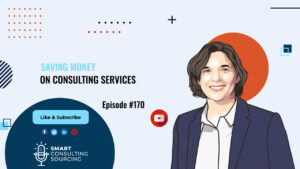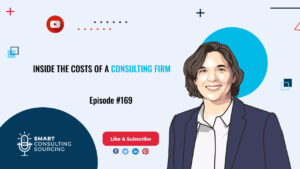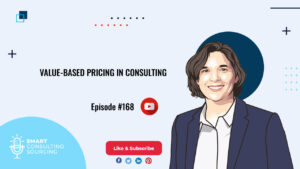Hello and welcome to episode 60 of our podcast: Smart Consulting Sourcing, THE podcast about Consulting Procurement.
My name is Hélène, and I’ll be your host today.
Each week I’ll give you the keys to better use, manage and source consulting services. This week, I’ll tell you how to find the right consultants for your projects
Last week, I explained why you should put consultants in competition
We saw that It’s a good idea to evaluate several consultants by putting them in competition. It will enable you to make an informed choice on what consultant is right for you on many levels, such as skills, fit, and price. Along the way, you may even go for ideas that are completely out of the box you had yourself designed in your request for proposal.
But today, I’ll give you my tricks to find the right consultants. But before we get there, you must figure out what you need.
What are you looking for?
The first question is not “do I need a consultant?” Instead, ask yourself: do I have an urgent problem? If yes, find your best understanding of the issue and why it needs a solution. Then ask yourself: what kind of consultant can solve this issue? Another way to put it would be: who should be part of my dream team to solve this issue?
What are the characteristics to look for, now that you know what you’re searching for? I call them markers, and the total sum of these markers makes the “consulting DNA” of a consulting firm.
Let’s return to the basics of consulting and of course, the obvious capabilities and industry dimensions are first on your list.
It is critical to understand which capabilities will be required for a project. Truth aside, Consulting Firms frequently describe their services differently than their clients do. They’re more likely to talk about what they do rather than the issues they address. They may also utilize technical jargon that their clients aren’t familiar with. You must act as a translator for them.
Our previous podcast “The 7 high-level capabilities every client should know” is a great place to start if you’re new to consulting.
Defining the type of industry expertise you require is simpler. However, be careful to include all the situation’s specifics and desired results to precisely describe what breadth and depth of knowledge you require.
For example, if you’re interested in the Oil & Gas sector, you might be interested in the industry as a whole, or your project might be about Upstream Operations, Exploration / Production, and Well Stimulation more specifically.
Where should they be located?
Now, you should consider the locations where the consultancy will need to operate, the languages it will have to speak, and the cultures it must comprehend. Consider also where and how the consulting team will have to communicate with project leaders.
Imagine a High-Tech company based in Germany with factories in Korea and the USA. They decide to hire a German consultancy that they worked with in the past. And now picture one of the German consultants explaining work organization in a Texas factory (that also works in Seoul actually). Yeah, you get the point.
Also consider the travel costs when deciding whether to hire a consulting firm. Long-distance consultants can add 25-30% to your project’s original budget. Do you need an on-site consultant? Is it possible to benefit from modern communication tools?
Besides, what are your policies for small businesses and freelancers? How long will your project take and how many locations will it require? Determining whether or not a larger firm with a global presence is right for your needs depends on your time constraints. If you only need help in one location and have a flexible schedule, you might be able to work with a smaller firm.
Now, knowing your budget is critical in identifying the best consultants for you. But, unfortunately, consulting costs vary by a factor of up to five from one company to the next. So it’s no surprise that bigger consulting firms charge more than smaller ones.
The size of a consulting firm is a pretty decent proxy of cost. If you have a limited budget, you’ll choose boutique stores in your region. If your funds are more plentiful, you may evaluate several sizes of consulting firms to see what works best for you.
This will also help you understand the trade-off between scope and cost, as well as the differences in size among businesses.
Find consultants with the right skillset
Now let’s talk credibility: there are 3 things that you need to look at: Brand, thought leadership, and partner profile.
Sometimes your project WILL require a brand. With board exposure or high political value, you want to work with big players. They will have credibility with the company’s top executives and investors, as well as the ability to roll with the punches if needed.
But let’s say you need deep expertise in multimodal transportation for process industries. Your teams dislike consultants because they “know nothing” or “are the school bus.” It’s time to bring in a consultant who knows about network distribution optimization and multimodal transportation. Your teams may warmly welcome someone who wrote books or articles on this subject. Same if they are former Supply Chain executives.
How do you want to work with your consultants?
Now, consider how you want to work with your consultants. Do you want them to help you diagnose or devise a solution? Or do you want them to help you implement your plans? Rarely do firms excel at both. Besides, implementation consultants are usually less expensive than strategy consultants.
Another dimension to take into account is the hard vs. soft approach. For example, let’s imagine that you want to reorganize your procurement team and redesign the processes. First, ask yourself what your priority is: Is it to get the buy-in of your existing teams? Are you looking for a collaborative approach?
In that case, you need to look for a consultant with a high sensibility to change. But if your main priority is to get the work done, you will need a consultant more focused on the hard aspects of the project.
And, how senior do you need your consultants to be? If you want to professionalize your teams, you will need consultants that transfer knowledge. Hence, you want to work with senior consultants that have on-field experience. On the other hand, if you are mainly interested in the results of the project, then you could work with younger consultants supervised by a more senior colleague.
Companies now have more ethnic, cultural, and linguistic diversity than ever. Beyond language, management culture, business etiquette, communication preferences, and other aspects of business life vary by country.
Who hasn’t tapped her fingers on the table in frustration while waiting for late French, Italian, or Spanish colleagues? What Southern European hasn’t grumbled about their Germain or Dutch colleagues’ rigidity? Everywhere in the world, there are similar differences.
In Asia, you may need consultants who understand the local culture and speak the language. Building trust with clients’ teams is part of the consultant’s job. It’s high-level acrobatics when half the message is lost in translation.
There is no such thing as the perfect one-size-fits-all solution for all projects. As a result, identifying appropriate criteria to look for a potential match is critical. It’s also an excellent way to get everybody on board with the project.
Where to get started?
Now let’s have a look at where to search, starting with the internal tools at your disposal.
Have a look at the resources from the procurement team, such as a list of Preferred Providers, an internal database of Consultants, or a list of consultants in your field. You could also have a database containing evaluation reports or prior bids that you can use to discover some interesting information.
Then, you may inquire about recommendations from your network/colleagues who have previously worked with Consultants. The interest of internal sources is that you often have a direct evaluation or connection with the consulting firm. However, bear in mind our motto: “The Expert you know may not be the Expert you need.”
On top of your internal sources, don’t hesitate to use external sources to grow your list. External sources are very helpful when you don’t have internal resources available for your project.
You can use a marketplace or a directory of consulting firms. However, keep in mind that many consulting companies buy a membership to these directories, which makes them appear more credible than they actually are. Try to find platforms that include detailed performance reviews, such as Conavigo.com.
You may also connect with professional organizations in your field or the skills you are looking for to connect with specialized consultants or ask for recommendations from your peers. Another option is to look for articles and books written on the subject you are interested in. Often management professors or authors are working as consultants as well.
There is also a large number of consultants listed on LinkedIn, but beware that this information can be outdated or incomplete. Finally, you may use a simple Google Search (or Qwant or DuckDuckGo) to look for other firms.
And don’t forget to evaluate each firm based on your criteria, whether you’ve worked with them previously or not.
Now that you have a list of potential Consulting firms, it’s time to find out more about them. A Consulting Firm might look like a perfect match on paper, but there is only one way to know if they have the right skills, industry experience, and project experience: talk to them!
That’ll be the focus of next week’s episode: how to qualify a consulting firm for a project?
In the meantime, if you have any questions, or want to learn more about what we do at consulting quest, just send me an email at helene.laffitte@consultingquest.com
You can also have a look at our website smartconsultingsourcing.com to know more about our book and download free templates & guides to improve your consulting sourcing.
Bye and see you next week! Au revoir!







